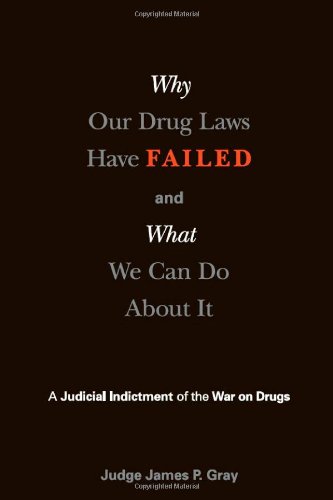"DEA agents chasing the supply found themselves at factories in China and India, pondering a new reality. The game was no longer about cocaine. The organizations were breeding something more lasting: entrepreneurs."
~ Ben Wallace-Wells, Mother Jones Magazine
For about the tenth time, I admit it. I’m a slow learner. I’ve lamented the drug war lots of times, in lots of places, covering many of the same points. Even in the wake of a recent blog post wherein I noted that education and health care are functioning properly from a statist perspective, I still didn’t realize the truth of the “War on (Some) Drugs” until now.
No, it was only after reading a fascinating article in Mother Jones, from which the quote above is taken, and particularly after deeply drinking of one of the thoughtful comments to that article, that it finally dawned on me: The drug war is working. The comment about which I speak, which I will examine below, was submitted by someone who refers to himself as “Just a guy.” He was responding to another poster who referred to himself as "Johnny Hempseed" whose comments I will also include.
Ironically, Hempseed posited many of the same arguments that I (and others) have vociferously made. They include: that history shows that drug use does not lead to a breakdown of society; that recent evidence in places like Portugal illustrates that legalization does not lead to a dramatic rise in users; that prohibition generates much if not all of the violence so attendant with the drug war. Yada. Yada. Yada.
 Why Our Drug Laws Have...
Best Price: $1.95
Buy New $25.25
(as of 07:45 UTC - Details)
Why Our Drug Laws Have...
Best Price: $1.95
Buy New $25.25
(as of 07:45 UTC - Details)
The initial respondent, "Johnny Hempseed," stated:
There were no thugs, gangs, hoodlums, or guns involved with any drugs before the early 1900’s. They were sold peacefully in apothecaries in cities and off of the back of wagons in rural areas. True, some users of opiates struggled with addiction, but the rate of addiction was virtually the same as it is today. Many church missions offered help to the homeless and drug and alcohol addicted.
He continued:
Until the early 1900’s there was virtually no stigma on cocaine or cannabis use whatsoever. These two medicines were routinely used on infants for things like teething pains or colic or restlessness. Sigmund Freud injected cocaine with a syringe every morning. Babe Ruth and Sandy Koufax were regular cocaine users, as were most professional baseball athletes.
He repeated something I've said a thousand times:
To end the War on Some Drugs we have to realize that the best way to attack every violent drug dealer in the country and simultaneously put them all out of business is to sell cannabis, cocaine, and yes, even heroin, legally in regulated outlets.
He ended with:
Almost every time you hear of a violent killing in the USA it’s because of unresolved commercial drug disputes. A person who can’t call the police is an excellent target for robbery. And these robbers then become targeted for violence, because you can’t sue them or have them prosecuted.
That's great stuff. Heck, he could have written my previous essays and saved me some work! He even used the terminology "war on SOME drugs" which is a personal favorite of mine. For the record, I agree with him in large part. However, "Just a guy" posted something that finally gave me pause. To wit:
 Our Right To Drugs: Th...
Best Price: $4.58
Buy New $13.27
(as of 11:10 UTC - Details)
That was a very well thought out reply and is the same conclusion that a large portion of our population has reached. Unfortunately however, it’s not about the “War on Drugs” or saving kids or anything else. It’s about profit. Money. The drug war is probably our country’s largest economy. Politicians, judges, lawyers, police officers, deputy sheriffs, jailers, prison guards, social workers, probation and parole officers, a third of the military, Customs, FBI, DEA, IRS, U.S. Marshals. The drug war makes these people's house and car payments at least in part. The drug war is about continuing to expend resources on an issue that will not go away. They’ll never legalize it. There’s too much money to be made fighting it and too many jobs at stake to make it legal. But it is what they should do, they just won’t.
Our Right To Drugs: Th...
Best Price: $4.58
Buy New $13.27
(as of 11:10 UTC - Details)
That was a very well thought out reply and is the same conclusion that a large portion of our population has reached. Unfortunately however, it’s not about the “War on Drugs” or saving kids or anything else. It’s about profit. Money. The drug war is probably our country’s largest economy. Politicians, judges, lawyers, police officers, deputy sheriffs, jailers, prison guards, social workers, probation and parole officers, a third of the military, Customs, FBI, DEA, IRS, U.S. Marshals. The drug war makes these people's house and car payments at least in part. The drug war is about continuing to expend resources on an issue that will not go away. They’ll never legalize it. There’s too much money to be made fighting it and too many jobs at stake to make it legal. But it is what they should do, they just won’t.
I wish I could say that no one has made these points to me before, but I can’t. (To those respondents who sent me e-mails with similar points, I apologize for being dense.) For some reason, “Just a guy” caught me at a point when the knowledge could seep in. The War on (Some) Drugs is functioning exactly as one should expect, even right down to the racial disparities in enforcement.
It is certainly an unfortunate fact that there are still people who don’t accept the historically-relevant and anti-prohibition, liberty-based arguments. (That so many continue to pettifog about the experience of decriminalization in Portugal simply illustrates the inherent weakness of the argument from effect.) It is equally unfortunate, if somewhat oddly reassuring, that these people’s existence has little to do with the fact that the war on drugs likely won’t end anytime soon, no matter the rhetoric of change we hear or might be convinced to believe in.
While I am convinced (by Hoppe, among others) that the power of the State rests largely on the approval of the masses, history illustrates that a tiny minority with sufficient economic undergirding, implied social authorization, and monopoly of force can exist and flourish despite the fact that the majority seemingly disagrees with them in principal. (Aside: South Africa experienced apartheid for decades while blacks outnumbered whites at least 10-to-1. Similarly, in the U.S. which has a population of over 300 million people, only about 2 million people work for the federal government, excluding the Postal Service. Having "them" outnumbered isn't sufficient to generate change.)
As one should expect from almost any action of the coercive state, the war on drugs has created a teeming caldron of self-interested drug-warrior-bureaucrats, people who benefit both from fighting the war, and just as important, seeing that it does not end. For these people the war on drugs is not only a calling, but an income stream. Worse yet, the drug war has spawned a network of supposedly private enterprises beholden to it. This is an ecosystem – large, well-funded, politically-entrenched – that exists directly as a result of the war on drugs. There is little chance that these people will simply return to normal life or that they would ever wish to do so.
 The violence, the power, the control, the money attendant with administering the war on drugs attracted them. The on-going battle keeps them busy and very gainfully employed. From the standpoint of the prison-industrial complex, the drug war has created a virtual cottage industry, and it's a really big cottage, complete with a whole new generation of slaves to work the plantation. The popular narrative – that without valiant drug warriors standing in the gap, drug abuse and crack whores would overwhelm the sacred American family and our way of life – is bogus and has always been so. The lessons of alcohol prohibition in the U.S. and drug decriminalization around the world bear this out. However, the popular narrative does somehow manage to keep many of the people the drug warriors claim to protect confused enough to not see the truth, even if that mattered.
The violence, the power, the control, the money attendant with administering the war on drugs attracted them. The on-going battle keeps them busy and very gainfully employed. From the standpoint of the prison-industrial complex, the drug war has created a virtual cottage industry, and it's a really big cottage, complete with a whole new generation of slaves to work the plantation. The popular narrative – that without valiant drug warriors standing in the gap, drug abuse and crack whores would overwhelm the sacred American family and our way of life – is bogus and has always been so. The lessons of alcohol prohibition in the U.S. and drug decriminalization around the world bear this out. However, the popular narrative does somehow manage to keep many of the people the drug warriors claim to protect confused enough to not see the truth, even if that mattered.
Conclusion
So what is the real message of this essay? And what does praxeology or Austrian economics have to do with it? All too often liberals, conservatives, progressives, and even libertarians are tempted to proclaim that [government program] isn't working. The ostensible facts bear the conclusion out. Free marketers tend to believe that such programs don't work due to the endemic inefficiencies of the State. One could therefore conclude that these programs, complete with the misplaced incentives that undergird them, continue simply due to the inertia inherent in a broken system. Some of that might be true, but the phrase, "cui bono" comes to mind. One should consider that before he concludes that a government boondoggle isn't working. It's working for somebody, or it really wouldn't keep on going…and going…and going.





